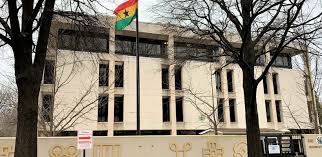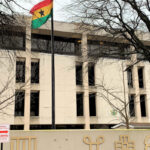Ghana’s embassy in Washington, D.C., has officially reopened after closure triggered by a major internal scandal involving unauthorised digital activity and suspected corruption.
The embassy had been temporarily shut down following the discovery that a locally hired IT personnel had secretly redirected visa and passport applicants from the official embassy website to a private entity, where unapproved fees were being charged. The Ministry of Foreign Affairs and Regional Integration revealed that this scheme went undetected for several years, raising serious concerns about oversight and internal controls at one of Ghana’s most high-profile diplomatic outposts.
In a statement released on Thursday, the Ministry confirmed that the embassy is once again offering full consular services. The reopening comes with what it described as a “renewed commitment to transparency and efficiency” under the leadership of a newly constituted diplomatic team.
All Ghanaian diplomatic staff based at the embassy were recalled after the scandal surfaced, and all locally recruited staff were suspended pending further investigations. A fresh team of experienced diplomats has now been deployed to oversee operations and implement reforms. A senior officer from the Ministry has been appointed to lead the team and steer the mission through a period of restructuring.
The fraudulent link, which redirected unsuspecting applicants to a private company, has been permanently removed. A technical team has since overhauled the embassy’s digital infrastructure, reconfiguring the official website and payment platforms to eliminate any potential for future abuse. The Ministry assured the public that all digital services are now secure, with enhanced monitoring systems in place.
The breach exposed glaring lapses in the embassy’s digital and administrative oversight, prompting swift action from the Ministry. According to officials, the full extent of the unauthorized transactions is still being assessed. The case has been referred to Ghana’s Auditor-General and Attorney-General for further review and possible sanctions.
The scandal has dealt a blow to Ghana’s diplomatic image abroad and has disrupted consular services for hundreds of Ghanaians and other applicants relying on the embassy for essential services. The Ministry acknowledged the inconvenience caused by the closure and promised that clearing the backlog of passport and visa requests would be treated as a priority.
“The reopening of the embassy marks a turning point,” the Ministry’s statement noted. “We are committed to restoring public confidence, safeguarding national interests, and ensuring that such breaches do not recur.”
The incident has sparked broader conversations within diplomatic and government circles about the vulnerabilities in foreign missions, particularly regarding locally sourced staff and digital security protocols. While the embassy is now operational, the reverberations of the scandal continue to prompt calls for tighter controls and regular audits across Ghana’s missions worldwide.
As operations resume under new leadership, the spotlight remains on how swiftly and effectively the embassy will rebuild trust with the Ghanaian diaspora and international partners in the United States.
















